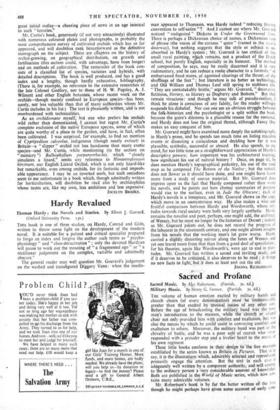Hardy Revalued
Thomas Hardy : the Novels and Stories. By Albert J. Guerard. (Oxford University Press. iis.)
THIS book is one of three studies, on Hardy, Conrad and Gide, written to throw some light on the development of the modern novel. It is suitable for a patient and critical specialist prepared to forgo an index and forgive the author such terms as " psycho- physiology " and " class-deracination " ; only the devoted Hardyan will pause to work out the meaning of "a fragmented ego" or "a rectilinear judgement on the complex, variable and admittedly obscure."
The general reader may well question Mr. Guerard's judgement on the washed and transfigured Diggory Venn: when the needle- man appeared to Thomasin, was Hardy indeed "reducing literary
convention to self-satire And I cannot see where Mr. Guerard noticed " undigested " Dickens in Under the Greenwood 7 ree. There is perhaps a-Dickensian choice of names, a Dickensian turn of phrase (the vision of the curious " quire " framed in the vicar's doorway), but nothing suggests that the style or subject is un- absorbed in Hardy's system ; Mr. Guerard is too critical of this small rural painting, wjieh remains, not a product of the Dutch school, but purely English, especially in its humour. The method of composition, he says, may be easily discerned and it is very rudimentary, and he can reduce' a rustic character to a formula "of embarrassed fixed stares, of agonised clearings of the throat, of shy shuffiings of the feet " - but literature is no better as technology, and Old William and Thomas Leaf still spring to stubborn life. "They are unmistakably brittle," argues Mr. Guerard, "decorative, fictitious, literary, as literary as Dogberry and Bottom." But they remain vivacious: and though he may talk of pseudo-realism, I think he alone is conscious of any falsity, for the reader willingly suspends his disbelief. Nor can one see an obvious struggle between the folk-historian and the psychologist or a split within the book, because the quire's dilemma is a plausible reason for the romance, and Hardy does not lose the original thread, although Fancy Day makes an easy conquest of him.
Mr. Guerard might have examined more deeply the autobiography in Hardy's prose, and he spends too much time on listing macabre events or dissecting a .coincidence and deciding how far it was plausible, syriabolic, Successful or absurd. He also spends, to my mind, far too little time on a straightforward appreciation of Hardy's descriptive powers: how important was his architectural training, how significant his use of natural history ? Once, on page 61, he does mention Hardy's topographical pedantry, his use of the road map as he composed The Return of the Native ; but the remark does not flower as it should have done, and one might have learnt more from a study of source material. But Mr. Guerard does impress upon us the fact that Hardy composed rather than wrote his novels, and he points out how clumsy summaries of purpose would rise to the surface, even in Jude the Obscure ; each of Hardy's novelais a timepiece, and Mr. Guerard shows us the cogs, which move in an unmysterious way. He also makes a wise and fruitful comparison between Hardy and WOrdsworth, whose atti- tudes towards iural society were both very largely aesthetic. Hardy remains the novelist and poet, perhaps, one might add, the architect, of Wessex, but-he must no longer be the historian of Dorset ; indeed, as Mr.. Glierard pdjnts out, he does not record the progress of the labourer in the nineteenth century, and one might almost imagine from his novels that the Working man's lot grew worse. Hardy carried a slightly distorting mirror along the lanes of Wessex, and yet one learnt more from that than from a good deal of speculation ; for his theories, again like Wordsworth's, were apt td end in plati- tudes. Mr. Guerard has written a sound and inviting study, and if it deserves to be criticised, it also deserves to be read ; it brings no new facts to light,. but it does at least sort out the old. JOANNA RICHARDSON.


















































 Previous page
Previous page